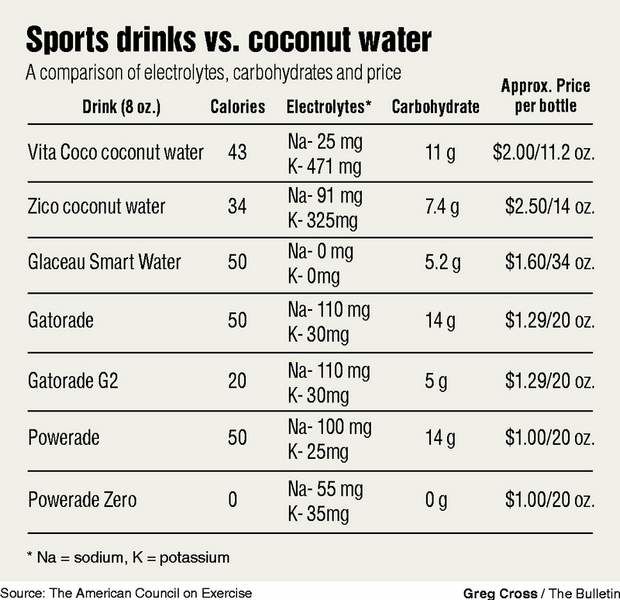Coconut water
Published 4:00 am Thursday, February 3, 2011

- Coconut water
Coconut water has been around for thousands of years, revered for its powers to restore health and improve beauty. Recently, it has hit the American market as a super drink.
Coconut water can be a valid sports drink substitution and has some valuable qualities, said Lynne Oldham, a registered dietitian at St. Charles Bend, but there is a lot of unsubstantiated hype about it, too.
“The hype includes that it is super hydrating, immune boosting, can dissolve kidney stones and strengthen reproductive functions and is a hangover cure,” said Oldham. “These are typically based on testimonials without evidence-based science behind them.”
Not to be confused with coconut milk, coconut water is clear liquid from the center of a young, green fruit (not the kind you find in a grocery store). The beverage is fairly plain, thin and watery, with a slight, natural sweetness and just a hint of coconut taste.
Where coconut milk is full of fat and calories, coconut water is low in calories and free of added sugar, cholesterol and fat. It’s full of electrolytes — potassium, sodium, magnesium — things athletes need to replenish after a workout, which is why it’s catching on as a sports drink. Four years ago, while training for a triathlon, Bend resident Bari Liebowitz started drinking coconut water instead of other more engineered sports drinks.
“It has low amounts of natural sugar, more potassium than a banana, tons of magnesium. It’s an amazing re-hydrant,” said Liebowitz, a local chiropractor who also has a master’s degree in human nutrition.
Without any food coloring, high-fructose corn syrup or artificial sweeteners, coconut water doesn’t aggravate Liebowitz’s asthma as much as drinks containing artificial ingredients.
Coconut water manufacturers acquire the product from family-owned plantations in Latin America, Indonesia and Asia. One coconut yields about 11 ounces of water, which is extracted from the fruit, pasteurized and bottled. It’s found in many local grocery stores, and generally in health food stores.
It’s chic and trendy and booming right now, in part because so many celebrities have been spotted drinking it, including Demi Moore, Kim Kardashian, Heidi Klum and Brook Shields. Madonna reportedly invested more than a million dollars in Vita Coca, a leading manufacturer of the drink.
But it’s not just cool, it can be practical, too. It would be helpful for patients with diarrhea in underdeveloped countries with unsafe water, Oldham said. It’s historically been used as an intravenous fluid, such as during World War II, but that doesn’t typically happen anymore, she said. A study conducted in 1954 looked at its intravenous use and determined that it might be useful for emergency treatment of hypovolemia — severe blood loss — if other sterile fluids were not available, Oldham said.
And it is good for the everyday athlete to drink after light and moderate workouts, she said.
The American Council on Exercise featured coconut water in its December nutritional spotlight. Noting that the drink was offered to runners in the 2010 Malibu International Marathon, the report debated whether it was truly a superior sports drink. The conclusion: For short and moderate workouts, a bottle of the coconut water can replace potassium and sodium. But longer endurance workouts require a higher-sodium sports drink that has more calories and carbohydrates.






